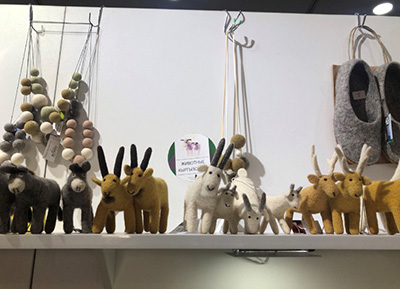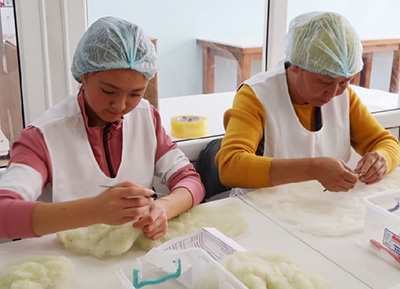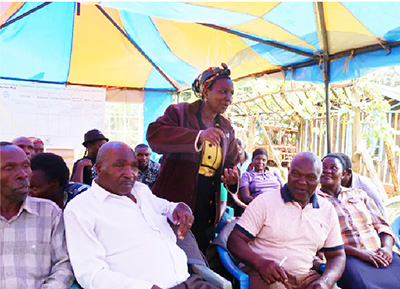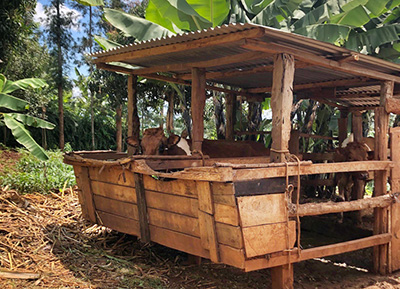Column
Women's Empowerment and Development
— A Peek into the ODA Project Sites —
In FY 2019, MOFA conducted an evaluation of ODA policy in the gender sector. As a part of the survey, the evaluation team took a field trip to the case study countries, Kyrgyz and Kenya to interview officials from local governments and international organizations and visit ODA project sites to meet beneficiaries.
Kyrgyz
Development Project in Rural Areas and Empowerment of Women
In Kyrgyz, which is located in Central Asia, the evaluation team drove through the mountains for several hours from Bishkek, the capital, to visit a project site in a small village in the Issyk-Kul Region, where poverty is more severe than it is in urban areas. The team visited a factory where local women were making wool felt products and cosmetics using local resources and selling them with the assistance of JICA experts.
In the rural areas of Kyrgyz, men generally work in grazing and women are tasked with unpaid domestic work and childcare. Therefore, there are not many opportunities for women to earn income, which leads to the issue that women have no voice at home and in the community.
Through this project, women have started making money for the first time in their lives and using the money for their households. In an interview, those women have told the evaluation team that their families were opposed to them participating in the project at first, but once they started earning cash income, their family members became supportive, and their presence at home increased.
This is a great example of Japan's ODA not only having an economic impact through training on manufacturing techniques for women to earn money, but also enhancing women's social status—which is to say women are being empowered.
This rural development project is highly recognized by the Kyrgyz government and other donors. From the remark made by former Kyrgyz President Jeenbekov in September 2019 expressing gratitude to Japan for its assistance, we can see that Japan's ODA contributes to sound bilateral relations.

Products made of Kyrgyz wool

Women making felt products at a factory in the Issyk-Kul region
Kenya
Empowered Women at Gender Awareness Training
The evaluation team also met empowered women in Kenya. The team drove for a few hours from Nairobi to visit a farm in the Kirinyaga Region, where an ODA project is being implemented to support small-sized family farms. At the farm, about 30 farmers, both male and female, sang and welcomed the team.
In Kenya, women have limited access to ownership of land and other productive assets, despite 70% of the farm work being done by women. Moreover, women are responsible for unpaid care and domestic work. The amount of work dedicated to unpaid care and domestic chores negatively affects women's labor productivity. Moreover, not having control over the family income or decision making at home is another factor that discourages women from being productive on the farm.
The team visited a project site where gender awareness trainingNote 1 are being implemented for farmers. The objectives of this training are to have both men and women reconsider their roles and responsibilities without gender-based bias in the household and at work; to understand that both men and women are in charge of the family farm; and to increase efficiency and income from farming.
At the training, both men and women discussed issues such as unfair burdens placed on women, which include water and wood fetching, and income control by men. After sharing these issues, they discussed fair solutions for both men and women. In an interview with the evaluation team, the farmers said that reducing women's household burdens enhanced their productivity and resulted in increased income of family farms. The project participants also told the team that sharing control over income and expenditure, by both men and women, led to better financial management. As a result, some farmers were able to start using electricity and gas at home and purchase a motorbike, which is an important means of transport. Some farmers showed the team large cows and a barn that they had purchased with their increased income and savings. Others told the team that once husbands and wives started cooperating on household tasks and farming, their relationships got better. This is a significant example of gender equality promotion at both work and home.

Participants of gender awareness training

A barn and the cows purchased with increased income
These projects are just a few examples of Japan's ODA in the gender sector, and many other good practices empowering women have been adopted in our partner countries. MOFA wishes to realize a society full of empowered women around the world.
Note 1 A series of training sessions, including lectures by experts and group discussions for groups of smallholder farmers to understand and find solutions to gender issues and to mainstream gender perspectives into the agriculture and livestock sector, supported by Japan.
